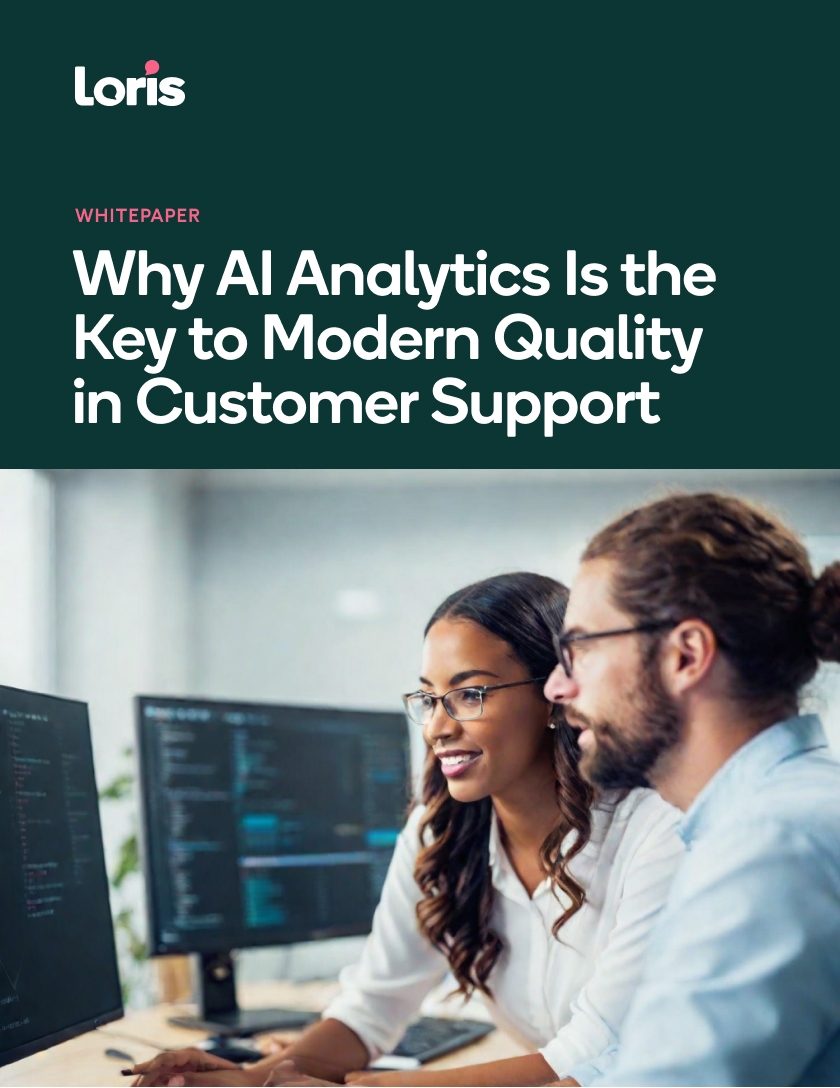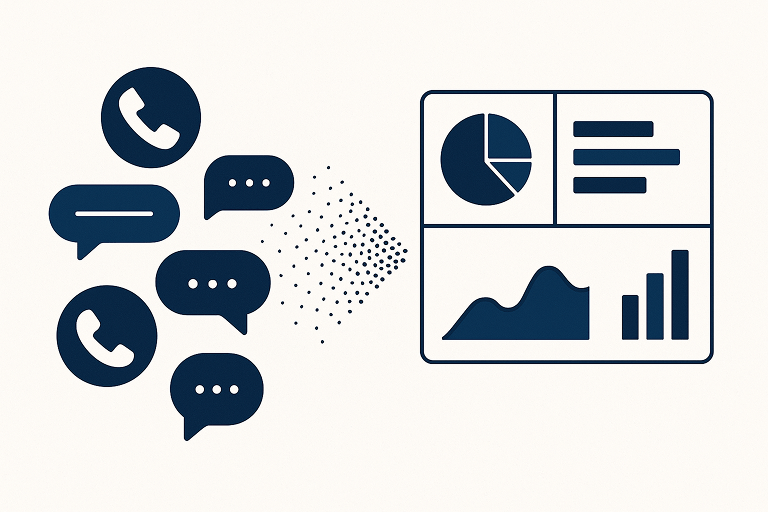
Your customer conversations are happening everywhere: phone calls, chat sessions, support tickets, even messaging apps. Whether you have hundreds or hundreds of thousands of them every month, each one contains insights that could reshape your business strategy, improve your products, or prevent your next customer from switching to a competitor.
But right now, those insights are trapped. Your quality assurance (QA) team samples maybe 2% of interactions. Your voice of the customer (VOC) program relies on surveys that capture sentiment weeks after the moment that mattered. Your product team makes decisions based on feature requests that filtered through three layers of management.
The conversation intelligence platforms flooding the market promise to change all that. Most deliver glorified keyword searches dressed up with a nice dashboard. Here’s how to find one that actually transforms how your business listens to customers.
Start with Your Biggest Business Questions
Before you look at any vendor demos, step back and ask: what are the critical questions your business can’t answer right now?
Why do customers in your enterprise segment churn at twice the rate of mid-market accounts? Which product features cause the most confusion and support burden? Are your competitors winning deals because of specific weaknesses customers mention but never formally report?
The best conversation intelligence platforms don’t just improve your contact center operations. They become your business intelligence engine for customer insights. If a vendor starts by showing you agent scorecards instead of asking about your strategic priorities, they’re thinking too small.
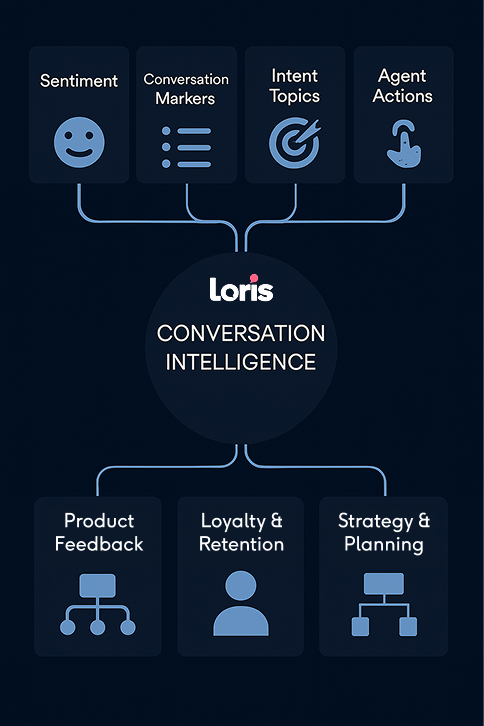
Think Beyond Traditional Feedback: Every Customer Touchpoint Matters
Your most valuable customer insights don’t just come from post support surveys. Likewise, individual interaction platforms can limit insights just to that channel. A comprehensive conversation intelligence strategy captures insights across every customer touchpoint and combines it in a unified view to can understand and act on.
This gives you something most businesses never achieve: a complete picture of what customers actually think about your products, services, and competitors.
Before you try to solve issues through QA or AI agents, see how analytics help you:
Find issue root cause, not just how agents are handling them
Combine customer and agent insight for feedback on the whole experience
See where to use AI vs human agents based on data, not guesswork
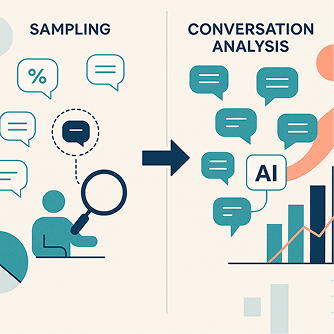
Quality Assurance That Scales Beyond Sampling
Traditional QA is broken. You’re evaluating 2% of interactions and hoping those represent the other 98%. You’re scoring agents on subjective criteria that don’t predict business outcomes. You’re missing compliance issues, coaching opportunities, and customer experience problems because they happened in the calls you didn’t review.
Even if you’ve automated a portion of the QA process, the focus is still on checking a more boxes faster, not using quality data as a feedback mechanism.
The right conversation intelligence platform transforms QA from a reactive compliance exercise into a proactive business improvement engine. Instead of random sampling, you get comprehensive analysis. Instead of subjective scoring, you get objective insights tied to customer outcomes.
More importantly, you can identify which agent behaviors actually drive customer satisfaction, retention, and revenue, not just which ones check the right line items on your scorecard.
Voice of the Customer That Actually Reflects Reality
Your current voice of the customer program probably relies on surveys, focus groups, and feedback forms that capture a tiny fraction of customer sentiment. The customers who respond to surveys aren’t representative of your entire base. The feedback you get is filtered and often weeks removed from the actual experience.
Conversation intelligence gives you unfiltered voice of the customer insights from every customer interaction. You’ll discover pain points customers never mention in surveys. You’ll identify product improvement opportunities directly from user conversations. You’ll understand competitive threats before they show up in lost deals.
This isn’t supplementing your voice of the customer program, it’s replacing it with something far more comprehensive and actionable.
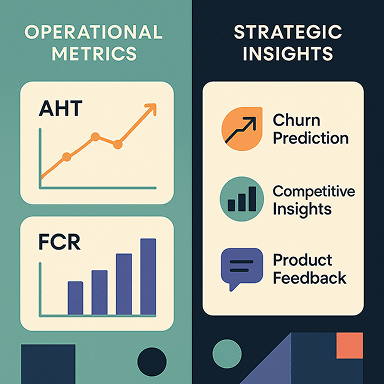
Ask About Strategic Insights, Not Just Operational Metrics
Most vendors will show you how their platform improves average handle time (AHT), first call resolution (FCR), and agent efficiency. Those operational improvements matter. In fact, they’re often how you justify the investment. But they’re also table stakes.
The real incremental value comes from strategic insights: Which customer segments mention your competitors most often, and why? What product issues are driving the highest-value customers to consider alternatives? Which pricing objections appear most frequently in enterprise sales calls?
Can the platform identify early warning signals for customer churn based on language patterns in support interactions? Can it quantify the revenue impact of specific customer experience problems? Can it surface product feedback that your formal channels never capture?
Integration Across Your Customer Data Ecosystem
The most powerful conversation intelligence platforms don’t operate in isolation. They connect to your business so you can see the impact of customer support interactions on your customer.
This approach lets you answer questions like: Do customers who mention specific pain points in support calls have higher churn rates six months later? Which conversation topics correlate with account expansion opportunities? How do product usage patterns relate to the issues customers raise in calls?
The Bottom Line
Conversation intelligence represents a fundamental shift in how businesses understand customers. Done right, it transforms every customer interaction into strategic intelligence that drives product decisions, prevents churn, improves agent performance, and identifies market opportunities.
Don’t settle for platforms that only optimize your contact center. Look for solutions that turn your customer conversations into your most valuable business asset—one that informs strategy across sales, product, marketing, and executive leadership.
Your customers are already telling you exactly what you need to know to grow your business and beat your competitors. The question is whether you’re listening comprehensively enough to hear them.
